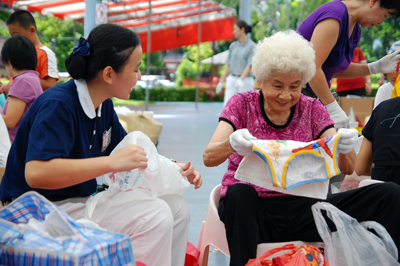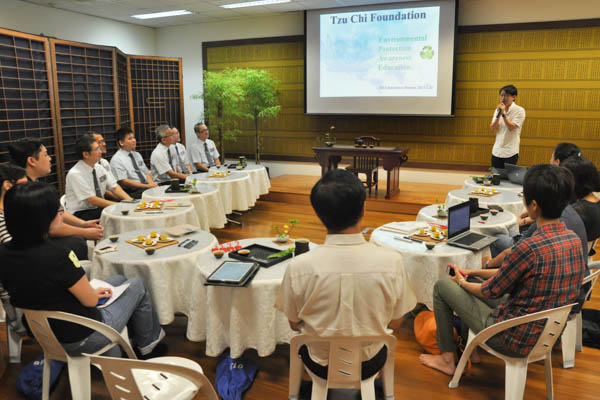
Children from the Kong Meng San Dharma class learning the recycling mnemonic. (Photo by Wu Ming Jun)
On 23 March 2016, volunteer Tan Xiu Zhen cheerily welcomed her visitors from the Aldrich Bay Government Primary School in Hong Kong at the Tzu Chi Eco-Awareness Centre. The students were aged from 9 to 12 years of age, and Tan who had lived in Hong Kong for 28 years, addressed her audience in fluent Cantonese, splitting them into two groups over which she and another volunteer would separately take charge of.
The 41-member group made up of teachers and students were in Singapore on a four-day and three-night environmentally friendly themed excursion. Under the recommendation of the tour agency, they visited the Tzu Chi Eco-Awareness Centre. Through informational posters and hands-on experience in sorting the recyclables, the students gained a better understanding of the topic.
Real Life Examples Bring Home the Message
Global warming is a problem deeply intertwined with our lifestyle habits. Due to rising affluence in modern times, excessive consumption has resulted in unnecessary waste. Hong Kong and Singapore have similar economic and cultural backgrounds and where environmental issues are concerned, there are areas where they can learn from each other.
Mathew Aw, a Tzu Chi volunteer who currently resides in Hong Kong, took the opportunity to visit his mother (Tan) during the holidays. Aw is very familiar with the living habits of Hong Kongers and has often seen leftover food wasted during his visits to the cafes. He pointed out to his group during the tour that if they had difficulty finishing their portion, they could share it with their parents to avoid wastage.
“Those of you who have been doing recycling please raise your hand!” At the sorting zone, it was heartening to note that the majority of students raised their hands.
At the Aldrich Bay School’s morning assembly or monthly assemblies, the teachers would disseminate recycling knowledge to students. Deputy principal Mr. Zheng Zhi Qiang hoped that with the new knowledge gained, his students could personally engage in recycling themselves, commenting that “Nowadays in Hong Kong, (people) indiscriminately discard rubbish; paper that has only been used on one side is thrown away, and plastic bags too (are routinely discarded).”
After sorting recyclables, student Ke Yi Zhen said, “We have to sort the recyclables with more care. The earth is our home and we must protect it to be able to continue living on it.”
Loving the Earth with Our Heart
“The Amazon rainforest is gradually disappearing, and millions or even greater numbers of climate refugees migrating to higher latitudes (is the result).” As she walked around viewing the posters, Xu Rou Jing read out the consequences of the world’s temperature rising by three degrees for her classmates to hear.
At every learning segment, Xu would join in enthusiastically. At the sorting zone, she listened and observed carefully, hoping to share what she had learnt to her family and friends back home. She said, “(We should) recycle resources to save the earth, because with global temperatures rising, the polar ice caps melt, and polar bears are in danger of becoming extinct.”
Teacher Ms. Yu Pei Ying who was leading the excursion from Hong Kong said, “When I was a child, we never had 2-to-3-degree temperatures. (Because of) the extreme weather this year, some places froze over with 2-degree winters, yet experienced 35-degree summers. People are becoming richer and when the weather gets hotter, they use air-conditioning more frequently.”
She also pointed out that Hong Kongers would buy anything that catches their eye, seeking to satisfy their desires. However, she hoped to reduce waste by cutting down on her purchases.
Following Good Practices
Three days after their visit, a 49-member group from the Kong Meng San (KMS) Dharma class arrived. The KMS temple is the first traditional Chinese forest monastery built in Singapore. First established in 1920, it has a large presence locally. Teacher Ms. Wu Li Ying is both the teacher in charge of the Dharma class for children as well as a Tzu Chi International Medical Association member.
Volunteers screened a recycling clip produced by Tzu Chi USA which conveyed the benefits of a vegetarian diet towards reducing our carbon footprints. This was followed by volunteer Roger Seen staging of a skit, during which he invited three members of the visiting group to play different roles, namely: a customer who over-orders in a fast food restaurant, a customer who orders another dish when the first does not please his palate, and finally, a poor and hungry person.
The improvised acting struck a chord in the audience’s heart, and brought across the message that we should “consume till 80% full” thereby reducing the load on our bodies and decreasing food waste. After watching the presentation, many students were seen nodding their heads as they recalled instances of themselves over-ordering at the fast-food restaurants.
“I learnt the 5Rs today: Refuse, Reduce, Reuse, Repair, Recycle.” Chen Yong Quan, a Primary Four student shared. He normally helps to sort the waste in his household and having picked up new tips after listening to the explanations by volunteers, was seen enthusiastically participating in the Q&A session. He also expressed that in future, he would only take as much as he could eat in order to reduce wastage.
Creating Blessings Together
Ms. Wu remarked that children nowadays do not realize the importance of recycling and hoped that Tzu Chi’s “ten fingers recycling mnemonic” would come in useful for them. Ms. Wu further expressed that everyone would be able to implement the knowledge they gained after the excursion in their daily lives. She planned to have every student bring recycled items from home during every Saturday Dharma class and gradually inculcate in them, a love for the earth.
As KMS’s own recycling team had just been set up, they need to recruit more manpower. They have been learning from Tzu Chi and KMS volunteer Ng Xin Zhao had visited the Tzu Chi Eco-Awareness Centre no less than 10 times after being told his scope of responsibilities.
Having visited a Tzu Chi recycling station in Taiwan, Ng knows of the Tzu Chi “thrift shop” concept which allows members of the public to purchase items which have been recycled. KMS has already set up its own recycling station, as well as its own thrift shop. Buying pre-loved items increases the lifespan of reusable items and the thrift shop opens its doors to the public once every month.
Ng believes that protecting the earth is one of the ways in which Buddhism can be incorporated into our daily lives and promoting earth-friendly causes through religion can motivate people to combat global warming together. He expressed his desire to contribute towards educating people about the topic and hopes to learn from Tzu Chi’s example in using interesting examples to reach out to the KMS students.
Since November 2014, the Eco-Awareness Centre has received 10 groups of visitors, making up a total exceeding 730 people. The Centre serves a useful function in equipping the younger generation with a better awareness of recycling and a stronger sense of mission in protecting our environment.

Tzu Chi volunteer Tan Xiu Zhen (holding the microphone) explaining the severity of global warming to students and teachers from Hong Kong. (Photo by Chua Teong Seng)

Tzu Chi volunteer Mathew Aw (holding microphone) currently resides in Hong Kong and took the opportunity to visit his mother in Singapore while conducting a recycling tour in Cantonese for the Hong Kong visitors. (Photo by Chua Teong Seng)

Xu Rou Jing (second from right) participated enthusiastically and hopes to share her knowledge with her parents and friends back home. (Photo by Chua Teong Seng)

Xu Pei Ying, a teacher from the Aldrich Bay primary school (right) hopes to reduce wastage by cutting down on unnecessary purchases. (Photo by Chua Teong Seng)

Deng Zhi Qiang, deputy principal of Aldrich Bay primary school capturing memories of the excursion down on camera. (Photo by Chua Teong Seng)

On 26 March 2016, 46 children and their teacher from the KMS Dharma class take a tour of the Tzu Chi Eco-Awareness Centre. (Photo by Chua Teong Seng)

Volunteer Roger Seen (first from right) invites three students on stage to participate in a skit to ingrain the message of avoiding food wastage. (Photo by Wu Ming Jun)

Primary Four student Chen Yong Quan (hands raised) already engages in sorting out waste at home, and enthusiastically responds in the Q&A segment conducted by volunteers. (Photo by Wu Ming Jun)

KMS volunteer Ng Xin Zhao (left) has often visited the Tzu Chi Eco-Awareness Centre to learn more from staff Huang Gong Hua (right). (Photo by Wu Ming Jun)

Teacher Wu Li Ying (right) hopes that teachers, students and their families alike, can actualize their recycling knowledge in daily life. (Photo by Wu Ming Jun)


